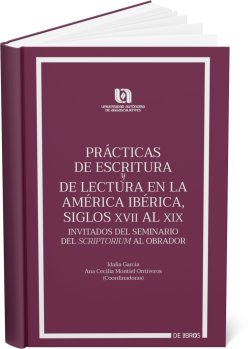Writing and reading practices in Iberian America, 17th to 19th centuries: Guests of the Scriptorium Seminar at the Obrador
Keywords:
Writing, Reading, Iberian America, 17th Century, 18th Century, Antique prints, Handwritten annotations, New Spain, Colonial era, New Spanish booksellers, Documentary heritage, History of books, History of libraries, Bibliographic heritage, Readers, Writers, Inquisitors, Printers, Fray Luis de Cisneros, Virgen de los Remedios, Santiago Manuel de Alday, Mexican high clergy, Ecclesiastical Boards of Censorship and Religion, New Spain printing services, New editions, Libraries of Brazil, Third Mexican Provincial Council, Women Writters, Argentina, Hermeneuts, Poets, Capuchin nuns, Alonso Alberto de Velasco, New Spanish religious cosmogony, Antonio and Gabriel Sancha, New Spanish book marketSynopsis
The writers of our past were authors of the books that circulated during the centuries in which Iberian America developed under the gaze of rules and regulations elaborated in Europe. Those books accompanied the daily life of all those men and women who moved from the Old World to settle in these territories, but also of those natives born in these latitudes of cultural mixtures that would define them in the long term and that today characterize the diversity of Latin America. It has been years since these two people who offer you these lines, dear reader, shared research interests and a solid friendship forged in the heat of our university lives. In this pair of authors who today give you this warning before entering this book, reader, there is a young academic in full development and one, not so young, who is working the last stretch towards the consolidation of more than two decades of work. The younger one is a historian and the older one started out as a librarian, but today she is an apprentice historian and master witch.
That first interdisciplinary contact allowed another daring step, which was the invitation to Ana Cecilia to formally become the second captain on board of an academic space founded at UNAM in 2002. At that time, we designed a research seminar dedicated to the study of antiquarian books, to which we invited librarians, researchers and professors who were working together until 2012. A decade later, the Internal Council of the Institute for Library and Information Research decided, without prior notice, to eliminate lines of research related to documentary heritage and book history. Such institutional decision also implied the definitive closure of our research seminar.
Two years later, thanks to the reading of a work program of the Interdisciplinary Seminar of Studies on Written Culture (SIECE) coordinated by Dr. Antonio Castillo Gómez at the University of Alcalá de Henares, we learned that there was a working group called “From the Scriptorium to the Obrador”. As you can see, kind reader, that conjunction could get us out of the proscription to be able to return to the public light, so we asked Dr. Castillo for authorization to baptize us this way, which he kindly accepted. With this name we presented ourselves to the public in 2014 and to the aforementioned councils, but we did not obtain the official authorization until 2017.
In this truculent history and not exempt of shipwrecks, there was the debt of an edition with the works of some guests. We do so now, fifteen years after the first edition of the seminar, compiling the chapters in which you will find numerous objects of study such as printed matter, libraries, readers, inquisitors, readings, annotations, authors and printers, by the hand of our guests and three members of our working group who have agreed to honor us with their reflections. Colleagues from all disciplinary frontiers and from geographies as close as Argentina, Brazil and Chile.
This seminar is a resilient and combative group because it not only shares an interest in knowledge, but also a deep commitment to public institutions, especially with the bibliographic legacy that concerns and occupies us. As a group, and individually, we have worked for years in archives and libraries, as privileged spaces and others not. We share the commitment with the social responsibility we have to safeguard from our place those patrimonial objects that we study. For us, these objects of study and the institutions that preserve them are more than accessories to intellectual vanities, they are a collective cultural heritage for which each of us is responsible in order to guarantee that future generations will enjoy the same cultural right of access to these resources.
Finally, we can only recognize that the bibliographic and documentary legacy that we inherited from our indigenous, colonial and nineteenth-century past is so great and incomprehensible, not because of its quantity, but because of its lack of registration and identification. For this reason, we do not consider that our task and our interests are an impediment to any other research group with similar interests. Let us remember that the historian Ernesto de la Torre Villar said that to face such a task we need all possible efforts and that none is unnecessary. Let us hope that one day this field of knowledge will become a space for exchange, rather than for battles and battles.
Chapters
-
Warning to readers
-
Fray Luis de Cisneros and devotion to the Virgin of Los Remedios in New Spain, 17th century
-
The library of Manuel de Alday, Bishop of Santiago (1712–1788).History and survival of his books, from colonial times to the present day
-
A frustrated inquisition? The failure of the Mexican high clergy and their Ecclesiastical Boards of Censorship and Religion, 1820–1823
-
Relationships between merits and services printed in Mexico in the 17th century: discovery of "new editions"
-
Voices in Libraries: A Provenance Marking Project in Brazil
-
A Council, a reader?The handwritten notes in the first edition of the Third Mexican Provincial Council of 1622
-
S.M.J.: Hermeneutist, teacher, and poet at the Capuchin nuns' monastery in Buenos Aires, 19th century
-
Alonso Alberto de Velasco, creator and supporter of the religious cosmogony of New Spain
-
The presence of Antonio and Gabriel Sancha in the New Spain book market

Downloads
Published
Series
Categories
License

This work is licensed under a Creative Commons Attribution-ShareAlike 4.0 International License.






